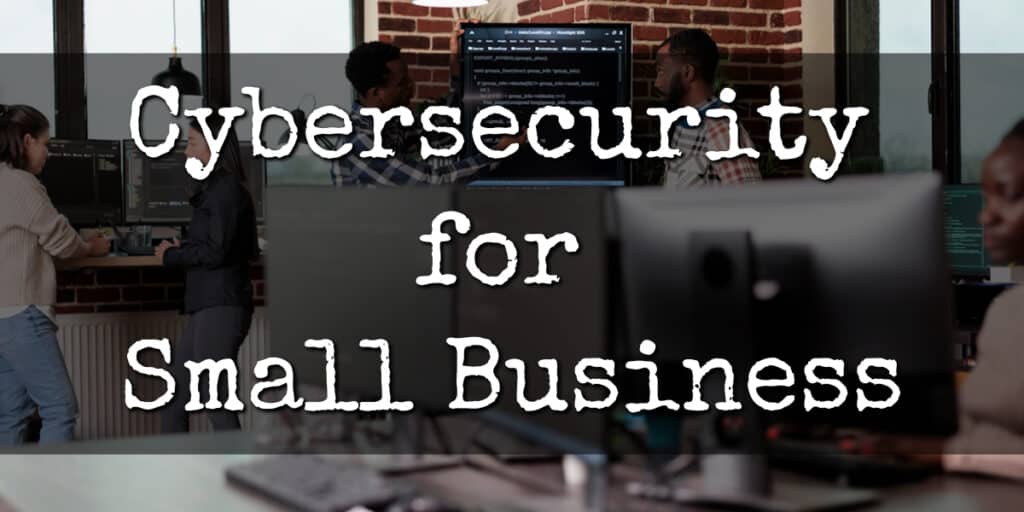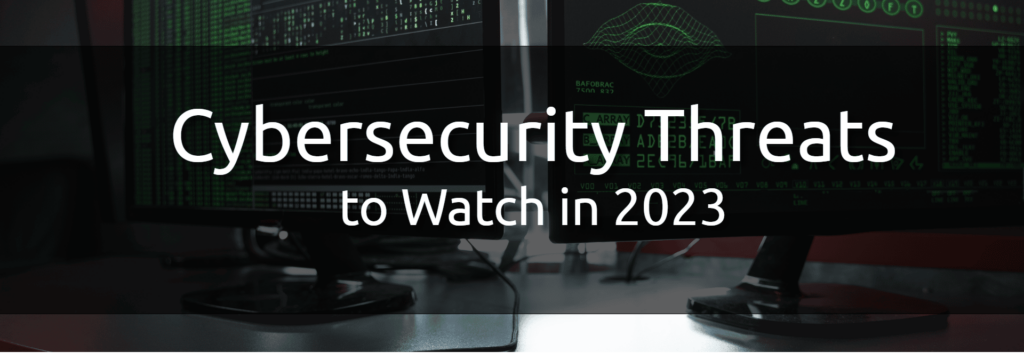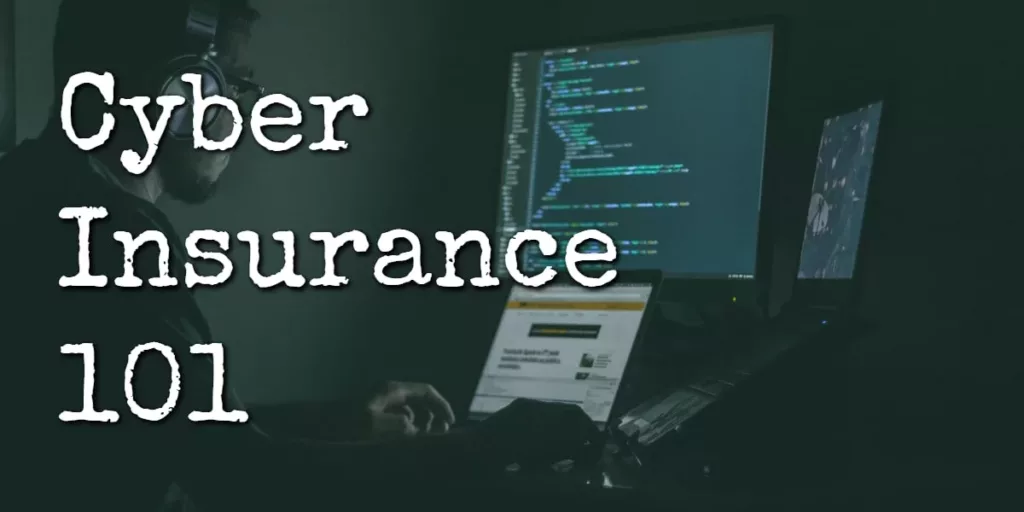In today’s digital era, cybersecurity has become a crucial aspect of every business, regardless of size or industry. Cybersecurity for small businesses, particularly, is increasingly vulnerable to cyberattacks due to their lack of security infrastructure and resources. So, how can small businesses navigate the treacherous waters of cybersecurity and protect their valuable assets?
This comprehensive guide will take you through the essential cybersecurity measures, best practices for employees, risk assessment, and cybersecurity plans. We will help you choose the right cybersecurity solutions and collaborate effectively with third-party vendors. Buckle up for a deep dive into the world of cybersecurity for small businesses!
On This Page:
The Importance of Cybersecurity for Small Businesses

Small businesses often find themselves in the crosshairs of cybercriminals, primarily due to their lack of security infrastructure and a tendency to overlook cybersecurity measures. As a result, these businesses are more vulnerable to cyberattacks, with 51% lacking proper cybersecurity measures in place as of March 2022. Furthermore, small businesses possess highly desirable information to cyber criminals, making them attractive targets.
The consequences of cyberattacks on small businesses can be nothing short of catastrophic. The stakes are incredibly high, from financial losses to reputational damage and even business closure. By understanding the importance of cybersecurity and taking necessary precautions, small business owners can significantly mitigate the risks associated with cyber threats, ensuring their businesses’ continued success and growth.
Vulnerability of small businesses
The heightened vulnerability of small businesses to cyberattacks can be attributed to several factors. Small companies typically have more digital assets than individual consumers, but less security than larger enterprises, making them prime targets for hackers. Additionally, they often lack the resources and expertise to invest in professional IT solutions, exposing them to various cyber threats.
These threats can take many forms, such as malware, ransomware, viruses, and spyware. If a hacker successfully gains access to a small business’s network, they can cause severe damage with the information they find.
Consequences of cyberattacks
A successful cyberattack can have devastating effects on small businesses. Data breaches can result in the loss of sensitive information, financial loss, and damage to the company’s reputation. The average cost of a data breach for small and medium-sized businesses can range from $826 to $653,587. With such high stakes, it’s no wonder that small businesses must prioritize cybersecurity.
One significant aspect of protecting small businesses from cyberattacks is ensuring data encryption. Encryption is a process that renders data unreadable by transforming it into codes, making it useless to hackers even if the data is stolen. By encrypting sensitive data, such as credit card and bank account information, small businesses can ensure that unauthorized individuals cannot access their valuable information.
Essential Cybersecurity Measures for Small Businesses

Small businesses must implement essential cybersecurity measures to protect customer information and other vital data from cyber threats. These measures include securing networks and wireless access points, implementing multi-factor authentication, and ensuring data encryption. By implementing these fundamental security measures, small businesses can safeguard their valuable assets and protect their customers from potential cyberattacks.
A robust cybersecurity foundation begins with implementing essential security software, such as antivirus solutions and hardware or software-based firewalls. Additionally, small businesses should invest in other security measures to further protect their networks and data. By taking a proactive approach to cybersecurity, small businesses can reduce the risk of cyberattacks and ensure the security of their critical data.
Securing networks and wireless access points
Securing networks and wireless access points is critical for protecting a small business’s internet connection and preventing unauthorized access to the network. To ensure the security of their networks and wireless access points, small businesses should implement firewalls, use strong passwords, and keep software up to date. Additionally, implementing a password to protect access to the router is essential to prevent unauthorized individuals from gaining access to the network.
Firewall security is also crucial for ensuring a secure internet connection. Enabling the operating system’s firewall or installing free firewall software available online is recommended. It is essential to make sure that a firewall protects employees’ home systems if they are working from home. Furthermore, ensuring their security with the use of a firewall is critical.
Small businesses can significantly enhance their security posture and safeguard their valuable assets by securing networks and wireless access points.
Implementing multi-factor authentication
Multi-factor authentication (MFA) is a security process that requires users to provide two or more forms of identification before accessing a system. MFA is paramount for small businesses as it adds an additional layer of security, safeguarding against unauthorized access. By implementing MFA, small businesses can significantly reduce the risk of cyberattacks and protect their valuable assets.
One example of MFA is FIDO authentication, which is a phishing-resistant authentication incorporated into browsers and smartphones. FIDO authentication obstructs attempts to breach accounts and can significantly decrease the risk of cyberattacks. Additionally, password managers can help users remember strong and unique passwords, directing them away from weak or reused passwords, and reminding them to change passwords regularly.
By implementing MFA, small businesses can enhance their cybersecurity and protect their valuable assets.
Ensuring data encryption
Data encryption is critical for small businesses as it safeguards sensitive information from unauthorized access. By encrypting all types of sensitive data, regardless of where they are stored or how they are transmitted, small businesses can significantly enhance their security posture. Access controls should be implemented, encryption keys should be regularly updated, and the infrastructure should be secured. Identifying and locating data, classifying data, and training users are also important.
Utilizing antivirus software and maintaining all software updated is essential to ensure security and enhance performance. By implementing data encryption, small businesses can protect their sensitive information and reduce the risk of cyberattacks. This, in turn, ensures their businesses’ continued success and growth.
Cybersecurity Best Practices for Employees

Employees play a crucial role in maintaining the security of a small business. By training employees in cybersecurity best practices, small businesses can effectively mitigate the risks associated with cyber threats and safeguard their valuable assets. Some of the best practices for employees include internet usage and email safety, password management, and device security, especially while traveling for business.
Small businesses can create a culture of security awareness by empowering employees with the knowledge and tools to protect themselves and the business from cyber threats. This, in turn, reduces the risk of security breaches, ensuring the continued success and growth of the business.
Internet usage and email safety
The most prevalent security risks associated with internet usage include phishing attacks, malware, and password attacks. Employees can safeguard their internet usage and email by avoiding dubious links and attachments, utilizing strong passwords, and being alert to phishing scams. By practicing internet usage and email safety, employees can significantly reduce the risk of cyber threats and protect the business’s valuable assets.
Education and awareness are critical factors in ensuring the safety of internet usage and email. Regular training sessions, security reminders, and periodic audits can help employees stay informed about the latest cyber threats and best practices for safeguarding themselves and the business from potential attacks.
Password management
Password management is a crucial component of cybersecurity, as weak passwords can be easily guessed or cracked. Employees should use strong passwords, update them periodically, and keep them confidential. Additionally, implementing multi-factor authentication on employees’ devices and applications can further strengthen the security of their systems.
Password managers can assist in maintaining secure, unique passwords for various accounts. By using a password manager, employees can avoid weak or reused passwords, and the software can remind them to change their passwords regularly. By practicing effective password management, employees can significantly reduce the risk of cyber threats and protect the business’s valuable assets.
Computer security
Computer security is the frontline of your business’s defense against cyber threats, which can cause significant financial loss and tarnish your reputation. A secure computer is the result of several key practices.
First off, make sure your software is always up to date; developers regularly patch vulnerabilities that hackers might exploit. Next, arm your computers with reliable antivirus software to detect and quarantine malicious software. Use a virtual private network (VPN) for secure and private browsing. And finally, avoid using public Wi-Fi networks – they’re playgrounds for cybercriminals. And if you do use one, ensure you’re using a VPN to secure your connection.
It’s crucial to establish stringent user authentication processes, keep all devices and applications up-to-date, and instill the principles of security in your employees. Above all, having firm cybersecurity policies in place to combat common threats like phishing and malware attacks is a must.
Mobile device security
Just like computer security, mobile device security is equally crucial in the modern business landscape. Mobile devices, though convenient, present a unique set of challenges and potential threats.
Stay one step ahead by keeping all mobile software and apps updated – this includes everything from your operating system to individual apps. A good antivirus program isn’t only for computers; make sure your mobile devices are equipped with one too. Just as with your computers, using a VPN can add an extra layer of security to your mobile device.
You should be wary of public Wi-Fi networks when using mobile devices for work, as these are prime spots for hackers. Establish clear mobile device policies and ensure that all employees are aware of them.
A vital aspect of mobile device security is user authentication. Passwords, fingerprint scans, or facial recognition can help protect a device if it falls into the wrong hands. Regularly educate your team about phishing scams, as mobile devices are often the primary target for such attacks.
Evaluating and Managing Cyber Risks

Evaluating and managing cyber risks is critical to maintaining a small business’s security. Small businesses can identify potential security threats and devise strategies to address them by conducting a risk assessment and developing a cybersecurity plan. This, in turn, ensures the continued success and growth of the business.
A risk assessment involves evaluating potential risks and vulnerabilities to a business’s network and data. It is essential for small businesses to conduct a risk assessment to identify potential security threats and develop a cybersecurity plan that addresses these risks. By taking a proactive approach to evaluating and managing cyber risks, small businesses can reduce the risk of cyberattacks and ensure the security of their critical data.
Conducting a risk assessment
Conducting a risk assessment involves determining the scope, recognizing assets, recognizing threats, recognizing vulnerabilities, analyzing risks, evaluating risks, and documenting the process. By identifying their assets, threats, vulnerabilities, and potential impacts, small businesses can conduct a comprehensive risk assessment that enables them to develop a robust cybersecurity plan.
The information gathered during a risk assessment can be used to create or refine a company’s security strategy. By analyzing the probability of a security breach and the potential consequences of the breach, businesses can prioritize their security measures and allocate resources effectively.
A well-planned risk assessment can significantly enhance a company’s security posture and protect its valuable assets.
Developing a cybersecurity plan
A cybersecurity plan is a document that outlines an organization’s strategy for safeguarding its information assets from cyber threats. It is essential for small businesses to develop a cybersecurity plan that addresses the potential risks identified during the risk assessment process. Small businesses can create a robust cybersecurity plan that protects their valuable assets by implementing user training, securing email platforms, and safeguarding information systems and data.
In addition to the measures mentioned above, a cybersecurity plan should also include guidance on incident response and recovery, as well as disaster recovery and business continuity planning. By developing a comprehensive cybersecurity plan, small businesses can effectively mitigate the risks associated with cyber threats and ensure the security of their critical data.
Choosing the Right Cybersecurity Solutions

Choosing the right cybersecurity solutions is crucial for small businesses to effectively protect their valuable assets and customers from potential cyber threats. By comparing cloud service providers and selecting the appropriate antivirus and firewall software, small businesses can ensure the security of their networks and data. Understanding the differences between various cybersecurity solutions is essential to making informed decisions that best serve the business’s unique needs.
The right cybersecurity solutions can significantly enhance a small business’s security, reduce the risk of cyberattacks, and ensure the continued success and growth of the business. Small businesses can effectively protect their valuable assets and customers from potential cyber threats by investing in the appropriate cybersecurity solutions and implementing the necessary security measures.
Selecting antivirus and firewall software
Antivirus and firewall software are essential for small businesses to protect their networks and data from potential malicious attacks. Some of the recommended antivirus and firewall software for small businesses include:
When selecting the right antivirus and firewall software, small businesses should take into account a few key considerations:
- Features: The software should have comprehensive features to deal with a wide range of threats. This includes real-time scanning, firewall protection, ransomware protection, phishing protection, etc.
- Capabilities: Ensure the software is potent enough to combat emerging threats and sophisticated malware attacks.
- Cost: Business budgets vary significantly, so it’s crucial to consider the software’s price point. Some options offer essential protection for free, while others might charge for more advanced features.
- Support Level: Having access to reliable customer support can be invaluable, particularly in times of crisis. Look for software with 24/7 support through multiple channels.
In addition to selecting the right antivirus and firewall software, small businesses should also ensure that they regularly update their software to maintain its effectiveness and enhance its performance.
By investing in the appropriate cybersecurity solutions, small businesses can significantly reduce the risk of cyberattacks and protect their valuable assets.
Selecting a Good Business VPN
A Virtual Private Network (VPN) is a must-have for businesses today. It provides additional security and privacy to the company’s internet connection. Here’s what to look out for when selecting a good business VPN:
- Security: This is the primary reason why businesses use VPNs. A good VPN should use advanced encryption standards like AES-256 to secure your data. Other security features to look for include kill switches and DNS/IPv6 leak protection.
- Privacy: The VPN should have a strict no-logs policy, meaning it doesn’t keep records of your internet activity. Some VPNs are based in countries with stringent data retention laws, so it’s best to avoid these.
- Performance: A VPN can slow down your internet connection because your data has to travel further to reach the VPN server, and it also has to be encrypted. So look for a VPN with a large network of high-speed servers.
- Number of servers and locations: A greater number of servers can mean faster and more reliable connections. Also, having servers in numerous countries will give you the ability to access content that may be geo-restricted in your location.
- Simultaneous Connections: Depending on the size of your company, you may need to have multiple connections at once. Look for a VPN that allows multiple devices to connect simultaneously.
- Ease of Use: The VPN should be user-friendly and easy to install and configure on all of your devices. Also, it’s beneficial if the VPN provider offers customer support via multiple channels.
- Price: Business VPNs are typically more expensive than personal VPNs, but they also offer more features like dedicated servers, a dedicated IP address, and sometimes even a dedicated account manager.
- Compatibility: The VPN should support all the platforms that your company uses (Windows, macOS, Linux, iOS, Android, etc.). Some VPNs also offer solutions for routers, which would protect all devices connected to your network.
- Reliability: Look for a VPN that has excellent uptime. If your VPN connection drops out frequently, it can disrupt your business activities.
- Customer Support: As a business, having access to fast and competent customer support is essential. Look for VPN providers that offer 24/7 customer support through multiple channels (email, live chat, phone, etc.).
Some highly rated VPN providers that generally perform well on these factors include:
Read my article on the best VPNs for businesses for more.
Comparing cloud service providers
When evaluating cloud service providers, small businesses should consider several factors:
- Certifications and Standards: Ensure the provider adheres to the relevant industry standards such as ISO 27001, PCI DSS, and sector-specific standards like HIPAA for healthcare and GDPR for businesses operating in Europe.
- Data Security: Data protection is paramount. The provider should have robust security measures in place, including encryption, firewalls, intrusion detection systems, and regular security audits.
- Scalability: As your business grows, your cloud needs will also expand. Choose a provider that can scale services according to your changing needs.
- Uptime: Look for providers that guarantee high uptime (99.99% is the industry standard). Any downtime can disrupt your operations and lead to financial losses.
- Customer Support: Opt for a provider that offers reliable and timely customer support, preferably 24/7 and via multiple channels.
- Total Costs: Consider not only the basic costs but also potential additional fees for data transfer, increased storage, or advanced features.
- Contract Type: Be aware of the flexibility of the contract, terms of service, and the ease of upgrading, downgrading, or canceling the service.
Some of the leading cloud service providers for small businesses are Amazon Web Services, Microsoft OneDrive, Google Drive, Dropbox, IDrive, and Box. By carefully comparing the features, capabilities, and support levels of different providers, small businesses can select the most suitable cloud service provider for their needs.
In addition to the factors mentioned above, small businesses should also consider industry-specific standards, such as HIPAA and GDPR, when evaluating cloud service providers. By selecting a provider that adheres to the relevant certifications and standards, small businesses can ensure the security of their sensitive data and comply with industry regulations.
Collaborating with Third-Party Vendors

Collaborating with third-party vendors can be a valuable strategy for small businesses seeking to enhance their cybersecurity posture. By assessing vendor security and establishing clear expectations, small businesses can ensure that their valuable assets and customers are protected from potential cyber threats.
Collaborating effectively with third-party vendors requires a proactive approach to assessing risks and setting expectations for both parties involved. Establishing a strong working relationship with third-party vendors is essential for the success of any collaboration. By understanding the unique risks associated with each vendor and setting clear expectations, small businesses can effectively manage their cybersecurity risks and protect their valuable assets.
Assessing vendor security
When evaluating vendor security, it is essential to identify potential risks, establish standards and corrective measures, measure and rate risks, prioritize vendors, monitor vendors regularly, implement security frameworks, and create policies. By assessing the security posture of vendors, small businesses can identify potential vulnerabilities and take appropriate steps to address them.
In addition to the measures mentioned above, small businesses should also consider the vendor’s data protection and privacy practices when evaluating their security. By taking a comprehensive approach to assessing vendor security, small businesses can effectively manage their cybersecurity strategy and protect their valuable assets.
Establishing clear expectations
Setting clear expectations is essential to ensure that all parties involved in a project or task are aware of their roles and obligations. This prevents any confusion or miscommunication that could lead to delays or other issues.
By defining the scope of the project or task, outlining the timeline, assigning roles and responsibilities, and formulating measurable goals, small businesses can effectively establish expectations and ensure the success of their collaboration with third-party vendors.
Summary
Throughout this comprehensive guide, we have explored the importance of cybersecurity for small businesses and delved into the essential measures and best practices for employees. We have also discussed the importance of conducting risk assessments and developing cybersecurity plans, as well as choosing the right cybersecurity solutions and collaborating effectively with third-party vendors.
By taking a proactive approach to cybersecurity and implementing the knowledge gained from this guide, small businesses can effectively protect their valuable assets and customers from potential cyber threats.
Frequently Asked Questions
How much does cybersecurity cost for small businesses?
For businesses, budgeting for cybersecurity can be daunting but necessary. On average, SMBs should expect to allocate approximately 10% of their annual IT budget to cybersecurity solutions and training.
As an example, for an IT budget of $2.5M, $250,000 could be allocated toward cybersecurity services. It is essential that SMBs prioritize their budget to ensure proper cyber protection.
Why is cyber security important for small businesses?
Cyber security is crucial for small businesses, because without it, they are vulnerable to data theft, financial fraud, and cyber attacks. Hackers may be able to gain access to customer lists, payment information, or other sensitive data, which can cost the business a great deal of money and damage its reputation.
What are the best cybersecurity practices for SMBs?
Small businesses should implement important cybersecurity practices, such as deploying firewalls, using secure passwords, backing up data regularly, and being proactive in monitoring security vulnerabilities. They should educate their staff on proper security protocols and keep their systems updated with the latest software patches.



